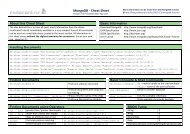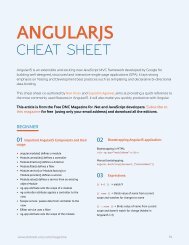build_your_own_angularjs_sample
build_your_own_angularjs_sample
build_your_own_angularjs_sample
You also want an ePaper? Increase the reach of your titles
YUMPU automatically turns print PDFs into web optimized ePapers that Google loves.
Build Your Own Angular Chapter 1. Scopes And Digest<br />
The var self = this; pattern is something we’ll be using throughout the book<br />
to get around JavaScript’s peculiar binding of this. There is a good A List Apart<br />
article that describes the problem and the pattern.<br />
Of course, this is not quite what we’re after. The $digest function’s job is really to call<br />
the watch function and compare its return value to whatever the same function returned<br />
last time. If the values differ, the watcher is dirty and its listener function should be called.<br />
Let’s go ahead and add a test case for that:<br />
test/scope_spec.js<br />
it("calls the listener function when the watched value changes", function() {<br />
scope.someValue = 'a';<br />
scope.counter = 0;<br />
});<br />
scope.$watch(<br />
function(scope) { return scope.someValue; },<br />
function(newValue, oldValue, scope) { scope.counter++; }<br />
);<br />
expect(scope.counter).toBe(0);<br />
scope.$digest();<br />
expect(scope.counter).toBe(1);<br />
scope.$digest();<br />
expect(scope.counter).toBe(1);<br />
scope.someValue = 'b';<br />
expect(scope.counter).toBe(1);<br />
scope.$digest();<br />
expect(scope.counter).toBe(2);<br />
We first plop two attributes on the scope: A string and a number. We then attach a<br />
watcher that watches the string and increments the number when the string changes. The<br />
expectation is that the counter is incremented once during the first $digest, and then once<br />
every subsequent $digest if the value has changed.<br />
Notice that we also specify the contract of the listener function: Just like the watch function,<br />
it takes the scope as an argument. It’s also given the new and old values of the watcher.<br />
This makes it easier for application developers to check what exactly has changed.<br />
To make this work, $digest has to remember what the last value of each watch function<br />
was. Since we already have an object for each watcher, we can conveniently store the last<br />
value there. Here’s a new definition of $digest that checks for value changes for each<br />
watch function:<br />
src/scope.js<br />
10 ©2014 Tero Parviainen Errata / Submit




